Showing 181–192 of 296 results
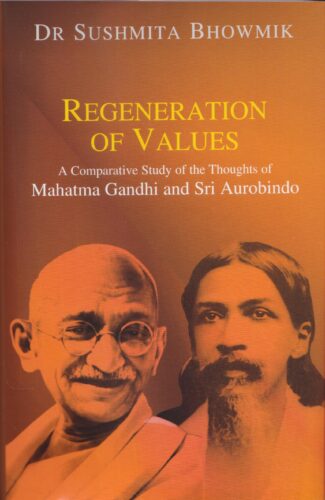
This volume makes a comparative study of the different values and approaches, philosophized and propagated by Mahatma Gandhi and Sri Aurobindo not only for the social, moral, political and spiritual life of Indians, but also for the benefit of the entire mankind.
Regeneration of Values: A Comparative Study of the Thoughts of Mahatma Gandhi and Sri Aurobindo reflects upon the different concepts of social, moral, political and religious values philosophized and propagated by Mahatma Gandhi and Sri Aurobindo.
Both these two great thinkers of nineteenth-twentieth century India tried to reconstruct the social, moral, political and spiritual life of the entire mankind through the revival of the ancient social and cultural values of India. However, the means adopted by them towards such regeneration of values were different in many respects. Here an attempt has been made to make a comparative study of their concepts of the different values as well as the approaches taken by them.

The book explains Samkhya philosophy through expositions/ interpretations of Samkhya works and authors. Tracing Samkhyas growth from sage Kapilas time to fifth century ad, it highlights various interesting aspects of Samkhya tradition.
Samkhya is the oldest among Indian philosophies. Rather, it had for long been synonymous with philosophy itself. Over the centuries, it has influenced all other Indian schools: orthodox and unorthodox. At its metaphysical plane, Samkhya is dualistic realism holding out the doctrine of two ultimate realities: prakrti (matter, physical world) and purusha (self, spirit). As a time-honoured tradition, Samkhya has, at its base, a long line of complex, often baffling expositions/commentaries/inter-pretations. Which, authored by ancient thinkers and sages, gave it both varied meaning and content. The earliest available work in this line of writings is Ishvarakrishnas Samkhyakarika (fifth century AD) a standard classic celebrated for crystallising the whole Samkhya thought of its times. Ishvarakrishnas work, however, has not only overshadowed all earlier expositions, but also led modern scholarship to mistakenly view the beginnings of Samkhya philosophy with nothing beyond Samkhyakarika. Professor Lallanji Gopal here dispels this and other widely-prevalent misconceptions. The book reconstructs anew the pre-Ishvarakrishna history of Samkhya. And also, for the first time, evolves a chronological sequence of all its landmark works and their authors. Meticulously tracing the historical development of Samkhya thought: from its genesis with the legendary Kapila to its standardised formulations in Samkhyakarika, Professor Gopal shows how Samkhya has never been a monolithic system, nor has its growth been unilinear; how it has had an interesting history of changes, vital shifts, introduction of new details, debates, and even polemics; and, finally, how Ishvarakrishnas work is the culmination of classical Samkhya, and not its beginning as most modern scholars have come to believe. Authenticated by an astonishing mass of literary sources, the book is bound to fascinate scholars and discerning readers alike.
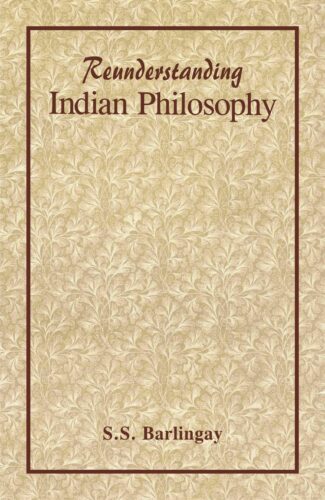
The book discusses the problems raised by the classical systems like Carvaka, Jain, Buddhism, Nyaya, Vaisesika, Samkhya, Yoga, Purva Mimamsa and Vedanta. It establishes epistemological, metaphysical and axiological significance of Indian philosophy, offering a unique insight.
What is Philosophy? Is it determined by any geographical boundaries? Does it emerge out of cultural patterns of the society? With such and other basic questions Prof. Barlingay analyses the concepts theories and trends in philosophy as they have developed in our sub-continent over the ages. Although this account of philosophy is called Indian he emphasises that the issues discussed by the ancient and medieval philosophers are essentially abstract and there is nothing Indian about this philosophy exclusively. Moreover, the understanding of Indian philosophy that has emerged in the past two centuries owes its direction and commitment to Indologist of Western orientation. Prof. Barlingays aim is to overview the Indian philosophy as presented by ancient and medieval philosophers and not the re-routed interpretation. Hence, he refers to it as a Re-Understanding. In this challenging endeavor Prof. Barlingay has discussed in-depth and critically the basic issues and problems raised by the orthodox and unorthodox systems like Carvaka, Jain, Buddhism, Nyaya, Vaishesika, Samkhya, Yoga, Purva Mimamsa and Vedanta. The book is replete with his logical reasoning. Within its anthropological context the author establishes a epistemological, metaphysical and axiological significance of the Indian philosophy offering the reader a unique insight in the subject.
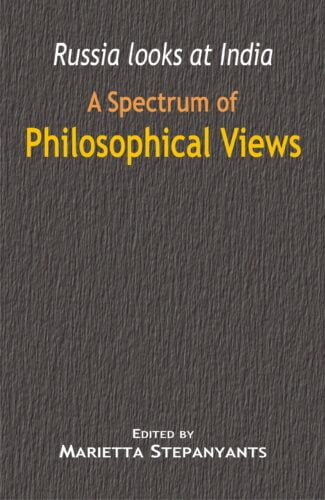
The book presents a collection of articles by Russian scholars on Indian culture, philosophy and religion, exploring the Vedas, Vaiseshika, Samkhya-Yoga and Mimamsa traditions. It also covers topics like modern interpretations of Vedanta, polemic of Vishishtadvaita and Advaita Vedanta.
This volume is a collection of articles, written by Russian scholars, on Indian philosophy, religion and culture. These articles explore key issues in the history of Indian philosophy, as well as the fundamentals of Indian religious thought and the problems of correlation between philosophy and religion in Indian tradition. The traditional schools of Indian philosophy, Samkhya and Yoga, Nyaya and Vaisheshika, Mimamsa and Vedanta, are analysed on the basis of their authoritative textual sources. Among other texts, Sankaras Brahma-sutra-bhashya and Ramanujas Gita-bhashya are studied in depth, with a special emphasis on the polemic between Vishishtadvaita and Advaita Vedanta. The later syncretic Nyaya-Vaisheshika is investigated on the basis of Annam Bhattas Tarkasamgraha and Tarkadipika as much as a critical analysis of Buddhist philosophy is undertaken through Shantarakshitas Tattvasamgraha. The modern Indian philosophy is also represented by highlighting the legacy of prominent personalities like Muhammad Iqbal and Sarvepalli Radhakrishnan. Due attention is given to the philosophy of non-violence of Gandhi and its relevance to the current problems of humankind. A comparative turn is represented by a paper on Leo Tolstoy and Sri Ramakrishna.
The book, as a whole, is an attempt to demonstrate the range and quality of contemporary Russian scholarship on Indian philosophical tradition and culture.
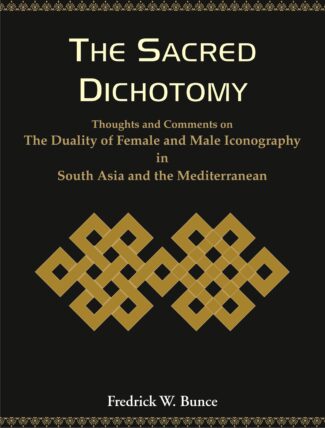
This work examines the dichotomy of the male and female principles in South Asian and Mediterranean religious and cultural traditions: Hindu (Sanskritic), Buddhist, Greek, Latin and Western mystical traditions. It is a comparative study that explores the roots and nature of the dichotomy of the sexes in these traditions by delving into the sacred in terms of myth, concept, imagery and symbols. The book will be useful to all interested in comparative religion and cultural studies.
With numerous illustrations, this work examines the dichotomy of the male and female principles in South Asian and Mediterranean religious and cultural traditions: Hindu (Sanskritic), Buddhist, Greek, Latin and Western mystical traditions. It is a comparative study that explores the roots and nature of the dichotomy of the sexes in these traditions by delving into the sacred in terms of myth, concept, imagery and symbols. With extensive notes, it presents drawings of more than 60 symbols and concepts revolving around the male and the female principles. With sharp insights and reflecting painstaking research, it delves into the rich and complex meanings attached to the moon, sun, dark/light, phallus, rose, svastika, womb and weapons in various religions. The discussion shows the dichotomy of the sacred in all major religions, mostly the male being elevated and the female made subservient. It explains how dichotomies are all embedded within cultural icons and the dualism is often based upon a localised concept of a good and evil, or a right and wrong, polarity. The book will be useful to all interested in comparative religion and cultural studies.
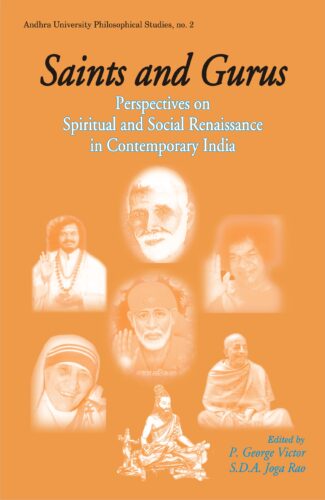
The papers bring out the metaphysical, religious, ethical and social significance of the teachings of modern saints and gurus. They reveal the significance of their understanding of God, the nature of soul, spiritual equality, concepts like karma and jnana and importance of truth and non-violence in the present day.
Saints and gurus have been the guiding spirit of Indian culture. Since ancient times the Indian society has been benefited by their spiritual message. This book is an attempt to bring out the metaphysical, religious, ethical and social significance of the teachings of modern saints and gurus like Ramana Maharshi, Swami Prabhupada, Sri Chandrasekharendra Saraswati, Mahatma Gandhi, Mother Teresa, Sri Satya Sai Baba, Sri Bala Sivayogi, etc. Presented at the national seminar on Living Saints and Gurus of India, the essays that contained in this book reflect the Indian wisdom and philosophy as believed, practiced and preached by some modern saints of India. They throw light on the understanding of Hindu philosophy in general, and the cultivation of a proper perspective on God, the nature of soul, spiritual equality, importance of truth and non-violence and concepts like karma, Jnana and samsara, in particular. They also analyse the Biblical perspective on sainthood. Importantly, the book relates the significance of their thinking, addressing the imperative concerns of the present-day society in promoting universal peace and brotherhood. The reader will have complete satisfaction out of the time he spends with this book and will get immense pleasure and a life changing experience. This book is for all those interested in Indian religion and philosophy, particularly their growth and relevance in modern context.
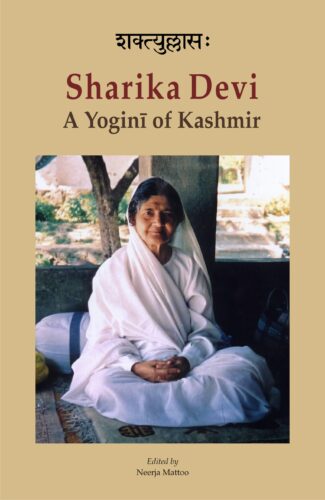
Sharika Devi, the chief disciple of Swami Lakshman Joo, is a modern-day saint of Kashmir Saivism. A many-splendoured personality, she was constantly absorbed in God-consciousness while performing her worldly duties. This volume reminisces of her spiritual powers.
Kashmir has a long tradition of yoginis (female saints) and poetesses from ancient times. The life of Yogini Sharika Devi is a witness to this unbroken tradition till the twentieth century. This book delves into the life of Yogini Sharika Devi, who was always absorbed in spiritual practice and in serving her guru, Swami Lakshman Joo of Ishwer Ashram of Ishber, Srinagar, Kashmir. Being the chief disciple of Swamiji, Deviji was well focused on her sadhana and was devoted to the mantra of silence for her spiritual prosperity.
Thus she is one of the women saints of Kashmir Saivism. An ideal disciple of her Gurudeva, Deviji was a many-splendoured personality, constantly absorbed in God-consciousness while performing her worldly duties. A jivanamukta, as enunciated by her Gurudeva, she wholeheartedly dedicated her entire life to the service of her Master with single-minded devotion. Though she led a simple life, many were witness to her spiritual powers while she was alive.
This volume, being brought out at the centenary celebrations of her birth, is a compilation of tributes from various people who knew Sharika Devi from close quarters, and who were a witness to her compassion and spiritual powers on numerous occasions. A valuable part of the book is Sharika Devis own contribution to it in the form of her mystic poems. An introduction by the internationally known scholar of Kashmir Saivism, Bettina Sharada Bäumer, makes the book invaluable.
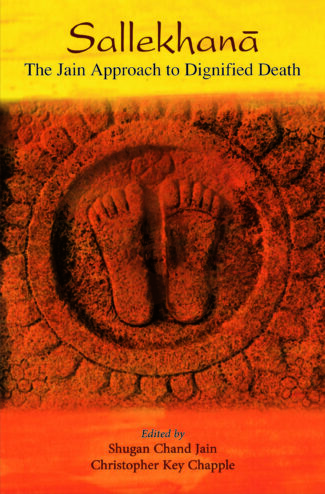
Jainism regards life to be eternal. Recognizing that the soul can never die, but merely takes a new body, a careful tradition welcoming death through intentional fasting developed more than two thousand years ago. A legal challenge Rajasthan was put forward in 2013, suggesting that this practice is harmful and coercive and targets women in particular. For a short while SallekhanÀ, which means the thinning of existence, was declared illegal. In response to this controversy, three conferences were convened by the International School for Jain Studies to explore the legal, religious, and medical aspects of this practice. Experts discussed the long history of the practice, attested to in epigraphs throughout India; the ways in which fasting to death has become an acceptable practice in the Western world; and contemporary instances of its observance in India. This volume presents an interdisciplinary approach to thinking about the end of life, from biomedical, historical, religious, and legal perspectives.
Jainism regards life to be eternal. Recognizing that the soul can never die, but merely takes a new body, a careful tradition welcoming death through intentional fasting developed more than two thousand years ago. A legal challenge Rajasthan was put forward in 2013, suggesting that this practice is harmful and coercive and targets women in particular. For a short while Sallekhanā, which means the “thinning of existence,” was declared illegal. In response to this controversy, three conferences were convened by the International School for Jain Studies to explore the legal, religious, and medical aspects of this practice. Experts discussed the long history of the practice, attested to in epigraphs throughout India; the ways in which fasting to death has become an acceptable practice in the Western world; and contemporary instances of its observance in India. This volume presents an interdisciplinary approach to thinking about the end of life, from biomedical, historical, religious, and legal perspectives.

This inspirational guide to an open, critical exchange between India and the West is framed as a tribute to Dr. Bettina Baumer, an eminent scholar of Indology. Comprising 32 essays, segregated into three sections Indian philosophy and spirituality, Indian Arts and Aesthetics, and Interreligious and Intercultural Dialogue.
The present volume is a tribute to Dr. Bettina Baumer, an eminent scholar of Indology and Religious Studies in general and of Kashmir Shaivism in particular, and one of the important exponents of interreligious dialogue. It contains 32 essays which are divided into three sections, representing the main fields of study of Bettina Baumer. Section I – Indian Philosophy and Spirituality is focussed on the non-dualistic Tantric Shaivism of Kashmir. The range of topics reach from an analysis of the term Vishranti/ repose (A. Chakrabarti, Hawaii), the first English translation of the Tantric hymn Bahurupa-garbhastotra (H.N. Chakravarty, Varanasi) to the Parvan rites described in Chapter 28 of Abhinavaguptas Tantraloka (A. Padoux, Paris) and a commentary on the opening verses of Abhinavaguptas Tantrasara (A. Sanderson, Oxford). This focus is complemented by other important contributions, for example on Gandhis Ethical Thought (J. Prabhu, Los Angeles) and an analysis of the interactions between Vedanta and Tantra, as shown in the Lalitatrishatibhashya (A. Wilke, Munster). Section II – Indian Arts and Aesthetics contains nine significant articles from outstanding scholars: Kapila Vatsyayan (on the representation of Mount Kailasa in myth, temple architecture and classical literature), Devangana Desai (on the relevance of textual sources in the study of temple art), R.N. Misra (the history of Shaiva-Siddhanta in Central India), R. Nagaswamy (Guhavasi and Devaraja in Cambodia) and others, along with illustrations. The last section on Interreligious and Intercultural Dialogue wants to stimulate the dialogue between the Indian and Western history of thought especially with two articles: an examination of the concept of the Self and its knowledge in the Western mystical tradition, compared with the concept of self-knowledge in the Upanishads (A.M. Haas, Zurich); and a study of Nothingness as a key term in Johannes Tauler. This part also contains reflections on an overcoming of the social, economic and political crisis of our contemporary world: e.g. on the cross-cultural dimension of an ethics of justice (M. von Bruck, Munich) and on the interculturation of religious life (F. X. DSa, Pune/Wurzburg). This section ends with the key article by R. Panikkar on essential questions in the dialogue between Hinduism and Christianity, presented through the metaphor of The Drop of Water. The volume will be useful not only to scholars of Indology, Indian Philosophy, Indian Arts, and Religion, but also to anybody interested in an open, critical exchange between India and the West or in search of ways out of the fundamental crisis of our time.
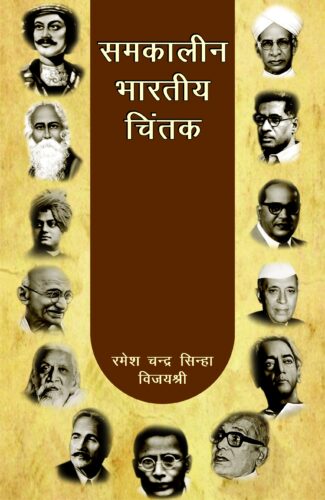
Phiolosophical thoughts of modern Indian thinkers are quite comprehensive. While they are conversant with the Vedas, Upanisads and the Quran, they are also quite known to the Western thoughts. Philosophical thoughts of Raja Rammohun Roy, Tagore, Vivekananda, Mahatma Gandhi, Sri Aurobindo, Iqbal, K.C. Bhattacharya, S. Radhakrishnan, M.N. Roy, Ambedkar, Jawaharlal Nehru, J. Krishnamurty and Loknayak Jayaprakash Narain are streamlined and discussed.
This is the age of enlightenment. The contemporary Indian thinkers accept and practise the old values, traditions, and have paved the way for a new thought process in philosophy. And this philosophy is the product of an age of India’s struggle against long and suppressive foreign rule, hampering the growth of our thought system. However, one could see a new synergy in post- independent India a philosophical renaissance. In such a background, these thinkers propose positive, synthetic and integral world-views.
The thoughts of contemporary thinkers are quite comprehensive and exhaustive because they are well aware of the Vedas, Upanishads and the Quran. On the other hand, modern Indian philosophers have reconciled between the Western and Eastern, and the ancient and modern thoughts. This volume streamlines the thoughts of Rammohun Roy, Rabindra Nath Tagore, Vivekananda, Mahatma Gandhi, Sri Aurobindo, Iqbal, K.C. Bhattacharya, Sarvepalli Radhakrishnan, M.N. Roy, Bhim Rao Ambedkar, Pandit Jawaharlal Nehru, and J. Krishnamurty.
It makes this book a good reading for the teachers and students of modern Indian philosophy, detailing the philosophical perspectives of popular modern Indian philosophers.

Phiolosophical thoughts of modern Indian thinkers are quite comprehensive. While they are conversant with the Vedas, Upanisads and the Quran, they are also quite known to the Western thoughts. Philosophical thoughts of Raja Rammohun Roy, Tagore, Vivekananda, Mahatma Gandhi, Sri Aurobindo, Iqbal, K.C. Bhattacharya, S. Radhakrishnan, M.N. Roy, Ambedkar, Jawaharlal Nehru, J. Krishnamurty and Loknayak Jayaprakash Narain are streamlined and discussed.
This is the age of enlightenment. The contemporary Indian thinkers accept and practise the old values, traditions, and have paved the way for a new thought process in philosophy. And this philosophy is the product of an age of India’s struggle against long and suppressive foreign rule, hampering the growth of our thought system. However, one could see a new synergy in post- independent India a philosophical renaissance. In such a background, these thinkers propose positive, synthetic and integral world-views.
The thoughts of contemporary thinkers are quite comprehensive and exhaustive because they are well aware of the Vedas, Upanishads and the Quran. On the other hand, modern Indian philosophers have reconciled between the Western and Eastern, and the ancient and modern thoughts. This volume streamlines the thoughts of Rammohun Roy, Rabindra Nath Tagore, Vivekananda, Mahatma Gandhi, Sri Aurobindo, Iqbal, K.C. Bhattacharya, Sarvepalli Radhakrishnan, M.N. Roy, Bhim Rao Ambedkar, Pandit Jawaharlal Nehru, and J. Krishnamurty.
It makes this book a good reading for the teachers and students of modern Indian philosophy, detailing the philosophical perspectives of popular modern Indian philosophers.
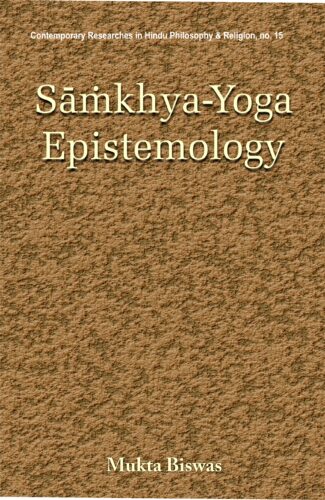
The book presents a comprehensive idea of the Samkhya-Yoga epistemology by examining in detail specific representative works including the Samkhyakarika of Isvarakrishna, Yogasutra of Patanjali, and Yuktidipika, Matharavritti and other schools of Indian philosophy. It discusses important tenets of each system, their reference in the Upanisads, the definition of epistemology and its relation with ontology and logic.
The book presents a comprehensive idea of the Samkhya-Yoga epistemology by examining in detail specific representative works including the Samkhyakarika of Ishvarakrishna, Yogasutra of Patanjali, and Yuktidipika, Matharavritti and other schools of Indian philosophy. Beginning with some fundamentals like origin of the words samkhya and yoga, it discusses important tenets of each system, their reference in the Upanishads, the definition of epistemology and its relation with ontology and logic. It delves into the two kinds of knowledge, direct (prama) and indirect (pramana) as understood by the Samkhya-Yoga system and examines these concepts from the viewpoints of other philosophical schools as well. It defines perception (pratyaksha pramana) and inference (anumana) and critically assesses the understanding of these in different philosophical systems focussing on the Samkhya-Yoga interpretation. It also deals with the components of perception and inference along with the types and fallacies associated with them. Verbal testimony or shabda is again treated in a detailed manner. The work examines aspects like the nature of word and logical structure of a sentence as well. The book will be useful for students and scholars of Indian philosophy who are keen to grasp the fundamentals of the Indian philosophical systems even while gaining in-depth understanding of each school of ancient Indian philosophy particularly their interpretation of concepts of knowledge.
| There are no products |